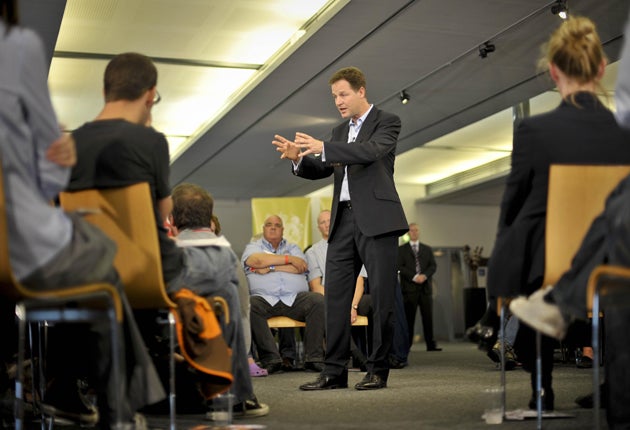Lib Dems to discuss closer ties with Labour at election
Consultation document warns of damage done by deal with Tories, as ex-leader denies defection claim

Your support helps us to tell the story
From reproductive rights to climate change to Big Tech, The Independent is on the ground when the story is developing. Whether it's investigating the financials of Elon Musk's pro-Trump PAC or producing our latest documentary, 'The A Word', which shines a light on the American women fighting for reproductive rights, we know how important it is to parse out the facts from the messaging.
At such a critical moment in US history, we need reporters on the ground. Your donation allows us to keep sending journalists to speak to both sides of the story.
The Independent is trusted by Americans across the entire political spectrum. And unlike many other quality news outlets, we choose not to lock Americans out of our reporting and analysis with paywalls. We believe quality journalism should be available to everyone, paid for by those who can afford it.
Your support makes all the difference.The Liberal Democrats will discuss the prospect of "working co-operatively" with Labour before the next election, despite agreeing to form a government with the Tories, it emerged last night.
As Nick Clegg, the Lib Dem leader, furiously rejected claims that former leader Charles Kennedy was considering defecting to Labour, The Independent on Sunday has established that the prospect of closer links with the opposition will be raised at the party's conference in Liverpool next month.
A consultation document on Party Strategy and Priorities, which will confront Lib Dem activists with the dilemmas raised by the decision to go into government with the Tories, will declare that: "nearer the next election, the Labour leadership will start thinking about how to promote and achieve the idea of working co-operatively with the Liberal Democrats.
"Our leaders will need to manage that journey and our relationship to it in a careful and balanced way which commands the continued support and understanding of the mass party."
The disclosure came after Mr Clegg's deputy, Simon Hughes, said last week his party should have a veto on coalition policies – as well as indicating that a partnership between the Lib Dems and Labour was still possible.
The unrest over the coalition arrangement was intensified by claims that Mr Kennedy had held "informal talks" with Labour whips about his future. Mr Kennedy, who remains popular with the party grass-roots, was said to be in "near despair" over the coalition and its programme of cuts.
Mr Clegg denied the reports as "nonsense", saying an email from Mr Kennedy described them as "the silliest of the silly season stories", but Mr Kennedy failed to make any comment. The reports ended a difficult week for the Deputy Prime Minister, filling in for David Cameron with an appearance before voters in Bristol, where he was forced to defend the coalition.
Labour leadership candidates leapt to take advantage of Mr Clegg's discomfort last night. Ed Balls said Mr Kennedy's defection would be "very welcome".
He added: "It would be no surprise because we've already seen thousands of Liberal Democrat supporters and members coming over to Labour since the election."
Ed Miliband said: "I want Labour to be the home of a new progressive majority in Britain. If Lib Dem MPs want to come to us, they would be welcome."
The latest bout of concentration on the Lib Dems' internal affairs came as it emerged that the party will be warned of the mortal dangers provoked by the historic doalition deal. The consultation document, laying out the "new opportunities, challenges and threats" that face the Lib Dems, threatens to become the blueprint for public feuding between different wings of the party.
The report will warn that, while the bulk of the party backs the coalition deal, there is still a hardcore of dissenters – dubbed the "all-end-in-tears brigade" – at odds with "the simplistic gung–ho supporters of ... coalition".
The leadership will be warned that it faces greater "scrutiny and aggression" from Labour, but also that being in government means they will be viewed critically by voters and that could damage the party at the election.
The veteran Lib Dem activist Gordon Lishman, who wrote the paper, said: "This new situation will require firm and clear leadership from the top of the party, inside and outside the UK government."
Join our commenting forum
Join thought-provoking conversations, follow other Independent readers and see their replies
Comments